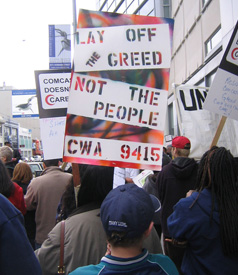Truthout is a vital news source and a living history of political struggle. If you think our work is valuable, support us with a donation of any size.
Executives of the top 50 job-cutting firms in the US earned 42 percent more than their peers in 2009, according to a report published by the Institute for Policy Studies (IPS).
As the country’s economy continues to struggle, and American workers earn less in weekly wages than they did in the 1970s (adjusted for inflation), executive salaries have remained substantially, disproportionately high. According to the IPS study, “Executive Excess 2010: CEO Pay and the Great Recession,” after adjusting for inflation, the average CEO pay in 2009 is more than four times its average from the 1980s and approximately eight times what it was throughout the mid-20th century.
“Our findings illustrate the great unfairness of the Great Recession,” said Sarah Anderson, lead author of the IPS study.
Almost three-fourths of the 50 firms surveyed in the study reported positive earnings after a period of mass firings – at least 3,000 workers per company between November 2008 and April 2010. Meanwhile, the layoff leaders received an average of $12 million in 2009, compared to the Standard & Poor’s 500 average of $8.5 million. In some cases, CEO pay during layoff years surged well beyond that range.
Among the culpable layoff giants are Fred Hassan of Shering-Plough, who made $50 million after merging with Merck and firing 16,000 employees; William Weldon of Johnson & Johnson, who laid off 9,000 and received $25.6 million; Mark Hurd of HP, whose severance package of almost $50 million followed his cutting of 6,400 jobs and resignation amid sexual harassment claims; and Kenneth Chenault of American Express, who fired 4,000 and made $16.8 million – after receiving $3.4 billion in federal bailout funds.
To add a hypothetical insult to injury, the $598 million in combined layoff-leader compensation could provide average unemployment benefits to 37,759 workers for an entire year, or nearly a month of benefits to the 531,363 individual workers fired by their companies.
The best antidote to hate speech and misinformation is truth. Click here to support real news.
“At a time when we should be pulling together to strengthen our shared economic futures, CEOs should not be rewarded for slashing jobs,” said IPS senior scholar Chuck Collins. “Realigning the interests of the CEOs with their employees and the rest of our country would be good for the economy and national morale.”
Bernie Lunzer, president of The Newspaper Guild-Communication Workers of America (TNG-CWA), says that excessive compensation is not new. “I think the trend really started in earnest in the early 80s,” Lunzer said. “What’s been troubling to me is that [CEOs] are rewarding themselves even during periods of bad performance. The same executives that helped bring the company into bankruptcy got a huge bonus for getting through it.”
Specifically, Lunzer said, federal regulations do not offer shareholders a substantial voice in reviewing and approving executive compensation. “Corporate law should be much more democratic,” said Lunzer. “Shareholders should be able to vote on whether CEOs have earned their compensation.”
The Corporate and Financial Institution Compensation Fairness Act of 2009, passed by the House of Representatives on July 31, 2009, aims to give shareholders a vote to approve CEO salaries, but their input is nonbinding and corporations are not required to acquiesce to their suggestions. In the United Kingdom, a “say on pay” provision passed in 2002, but has had little effect on a continuing rise in executive salaries.
One of the negative effects of ballooning corporate pay is its perversion of the “American dream,” Lunzer said. “People identify with this class because they feel they might get there one day, rather than seeing the unfairness of it … what we need more than anything is transparency. People in public companies, the shareholders, need to be able to weigh in.”
A terrifying moment. We appeal for your support.
In the last weeks, we have witnessed an authoritarian assault on communities in Minnesota and across the nation.
The need for truthful, grassroots reporting is urgent at this cataclysmic historical moment. Yet, Trump-aligned billionaires and other allies have taken over many legacy media outlets — the culmination of a decades-long campaign to place control of the narrative into the hands of the political right.
We refuse to let Trump’s blatant propaganda machine go unchecked. Untethered to corporate ownership or advertisers, Truthout remains fearless in our reporting and our determination to use journalism as a tool for justice.
But we need your help just to fund our basic expenses. Over 80 percent of Truthout’s funding comes from small individual donations from our community of readers, and over a third of our total budget is supported by recurring monthly donors.
Truthout has launched a fundraiser, and we have a goal to add 273 new monthly donors in the next 72 hours. Whether you can make a small monthly donation or a larger one-time gift, Truthout only works with your support.
